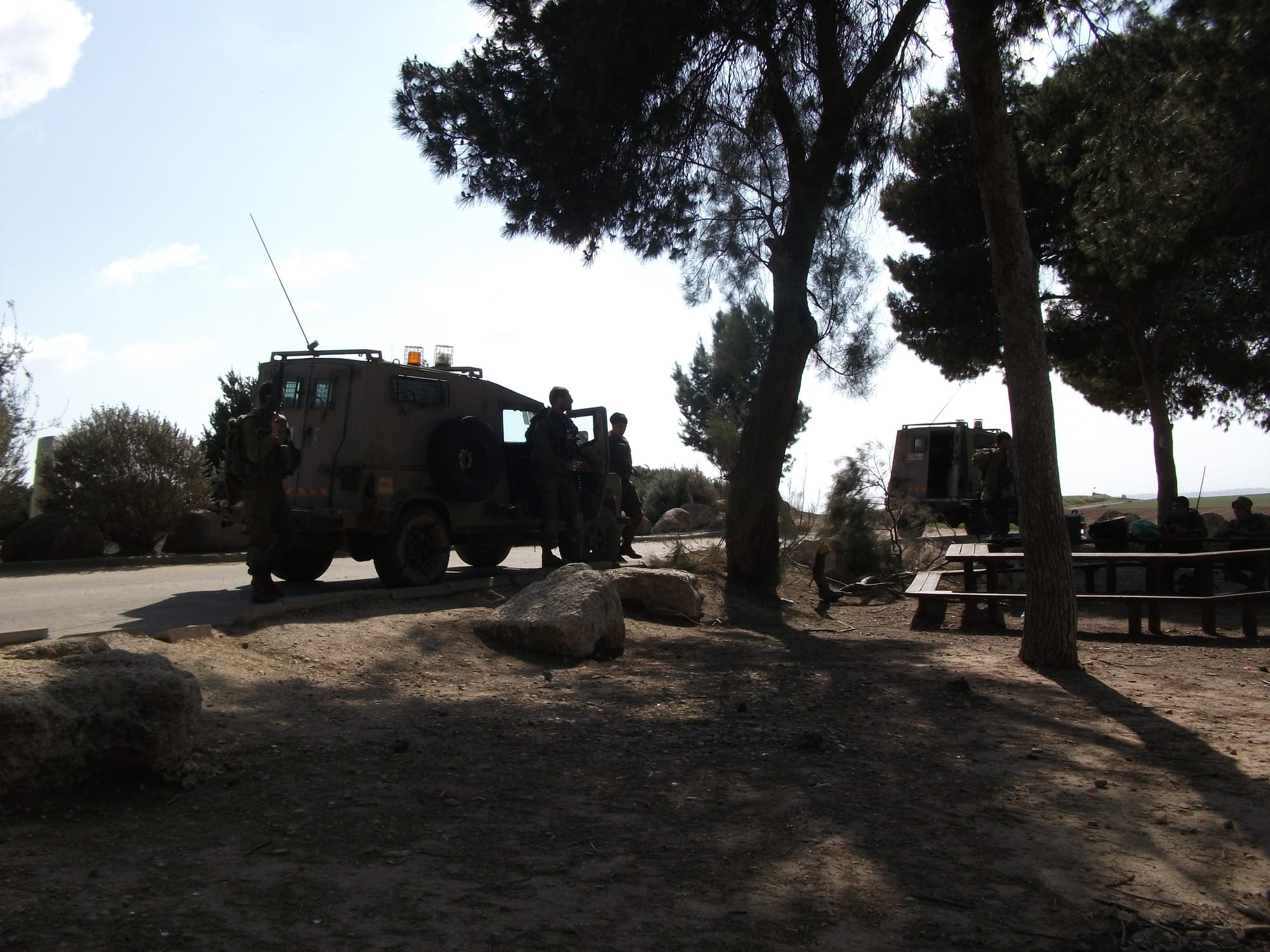The Gaza Border

He went on, “I usually have a machine gun mounted on a tripod, but it's broken and in the workshop.” He told me that he liked technology and that computerised triggers were safer for everyone when you could fire the gun on top without getting out of the vehicle. He was laughing again now. “It’s always better if you don’t have to stick your head out of the window. If you can see the enemy – the enemy can see you!” He explained as if it was something we all had to learn as new recruits. Thinking about how much responsibility he had, I offered him a sobering question: “When you are running on adrenaline, would it be easy to fire in anger or panic, with all that at your fingertips? One move can change the mood of the People around here and it escalates pretty quickly.” “No!” he said earnestly. “It’s a serious weapon and there would always be a discussion before it was fired. I promise you, I have only ever fired in training. We would all rather be somewhere else, so we are not going to make things worse for ourselves.” I believed him, and as the others slowly gathered around, I saw they were nodding in agreement and I thought, as I often do, it’s a shame they have to sacrifice their late teenage years doing National Service. After a thoughtful pause, the brother of the future goalkeeper asked where I had been on my travels with Hanitai. When I told them that I had been to the Occupied Territories earlier in the week, a few eyebrows were raised and they asked where exactly I had been. I was a bit stumped after mentioning the big towns, but told them how I saw the difference in settlements on each side of the country. “On this side of the country, everyone in the kibbutzim, is nice and hospitable, even though they are dodging missiles. In the West Bank, the Settlers told me to get lost.” They thought this was funny and all agreed that they tell them to get lost too, even though they are supposed to be taking care of them. As they were showing great interest in my travels, we decided that it would be best for Hanitai to explain where I had been. I shouted across to him and he waved his ok and got the map and a highlighter out of the passenger seat. Within a few minutes, they were all gathered around him as he explained our expedition. I stood aside and watched, especially as it was a conversation in Hebrew, but I noticed the respect they gave him. One sat cross-legged on the table beside him and another on the other side peeled an orange and piled the peel onto his dirty plate as he listened. Heads bowed over the map, spread on the table, they hung on his every word as if it was a briefing and I could tell that he loved teaching them. I went over to the duty chef who was banging a piece of a paraffin stove on the table and blowing into the burners which seemed to be blocked. “Is it broken?” I asked. “Yes, we need a new one I think!” he said. This one wore a khaki bush hat and earphones with a microphone attached. Hebrew dialogue came through loudly on the radio in the Landover, and when the soldier spoke, I could hear their exchange. “Are you keeping in contact with the patrol to make sure they are safe?” I asked. “Yes I’ve got them, he said confidently. “Don’t worry about the others on the border, we are always in contact. You need to learn Hebrew!” he said, as if he would be better if I could understand the communications. I felt pleased that I was a trusted party. He gave up on the stove and threw it into a box and I gathered a few of the plates from the table. He went to put them into the box with the clean mess tins, like a young lad who might be great on his radio, but his kitchen skills were lacking. “Do you have to use these plates again?” I asked. “No, we’ve got lots!” “Why don’t you put them in the picnic site rubbish bin, then all the mess tins won’t be covered in sauce?” “Ok.” he agreed. “Good plan!” His face beamed at me as if I was a useful, but fussy aunt and he proceeded to gather all the disposable stuff and took it to the bin in the picnic area. He was just heading for the last pieces when the wind blew and a plate landed face down on the map. There were cries of disgust as the bits of spaghetti drew new roads and another soldier who hadn’t spoken previously tried to flick it off with his finger. They laughed as they shared some Hebrew banter about the situation. “It is always good to have some lunch left on the map!” the tall comedian in the black woollen hat told me. ”You might need it later!” My goodness, how we all laughed! Time with my unexpected lunch companions had been great. I would never have dreamed of joining a patrol and couldn’t have done so without Hanitai. He always made special experiences fall into my lap. I keep the map with me here as I write, sauce stains and all, as it brings me closer to the memorable day with the cold pasta brigade.


